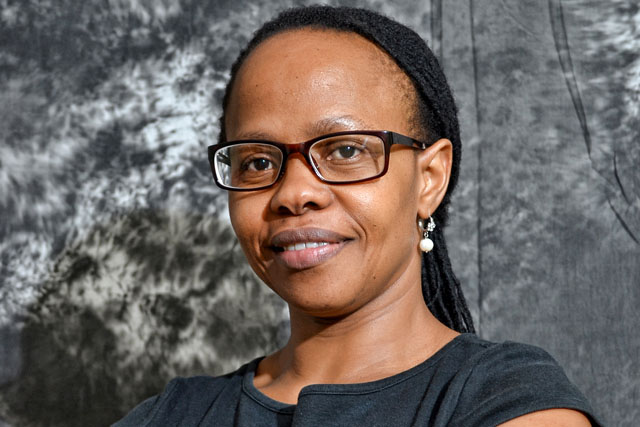Alan Khan, the Senior Director of Corporate Affairs at DUT, caught up with Professor Thenjiwe Meyiwa, DUT’s recently appointed Registrar, for the DUTLINK. Prof Meyiwa assumed her duties at the University in October last year (2014). A former Research Director at the Human Sciences Research Council (HSRC), Prof Meyiwa is a National Research Foundation (NRF) rated social scientist whose research interests include cultural constructions of gender and the impact of HIV/AIDS on parenting, woman and caregivers.
Alan: What is your earliest childhood memory?
Prof Meyiwa: The one recollection that stands out for me is my family and I having breakfast together around a seven-seater table most days, even during the week. This was with my parents and four siblings. I treasure this memory. I recently tried resuscitating this practice with my family and must admit, I am not doing well at all.
Alan: As a teenager, who was the biggest influence in your life?
Prof Meyiwa: It was Phumzile Mlambo-Ngcuka, my ex history teacher in grades 11 and 12… and I’m not name dropping. She was affectionately known as MaMlambo. She instilled critical thinking in us. She would teach us the syllabus and then have robust debates on social and political issues. She is one of the people I credit for formulating my academic career.
Alan: When you attended high school, what career did you want to pursue?
Prof Meyiwa: Teaching, that’s my first love. It is a noble profession. I hope to go back to the classroom in the near future. Actually, I have not stopped teaching. I do so through higher degree supervision, but that is not enough. I miss teaching.
Alan: What did you enjoy most about your student varsity days?
Prof Meyiwa: I vividly recall the change from being catered for by Fedics, a catering company, to self-catering. I liked this transition which led to my paternal aunt, a great cook, doing most of the cooking. We went to school together.
Alan: Why did you want to join DUT?
Prof Meyiwa: Actually, the question should have been, “Why did I return to DUT?” Having been at a research company that was more corporate and business-like than academic in its intent, I came to a point when I thought going back to mainstream academia was the best thing to do. I enjoy working and engaging with students whenever possible.
Alan: What is the best part of being the Registrar?
Prof Meyiwa: Participating in graduations. I reckon that these are the best proud moments for any university and any registrar in particular.
Alan: What would you do to make South Africa a better place?
Prof Meyiwa: To live up to the reality that we are an oral society. I would work on improving communication channels. We need to talk more, engage more and listen to each other more; ideally face-to-face. In that way we would increase our knowledge of each other, understand each other better and in turn, maximise our relations and regard for each other.
Alan: Tell us about the book that you are currently reading?
Prof Meyiwa: Speed of Trust by Stephen M.R. Covey (son of Stephen R. Covey). I have read it several times and each time I do, I learn something new afresh. The book was given to me by a long-time friend. Everyone should read this book or at least its reviews and blurbs. It is an essential read for all managers. It validates the importance of trust in any relationship; be it personal or business. It emphasises the fact that reputation is crucial for institutions. It submits that trust has a huge impact on results, any results and that trust within an organisation makes or breaks it. An organisation (or relationship) that has a trust deficit creates a climate of suspicion, second-guessing and ultimately, results in low morale and low standards of performance.
Alan: Who is your favourite musician?
Prof Meyiwa: There are many to list but I would single out Randy Crawford and Caiphus Semenya.
Alan: If you had to write a newspaper headline about yourself, what would it say?
Prof Meyiwa: I would reflect on motherhood and my varied roles in this field. I am a mother to many, including my biological daughters, nieces, nephews, my students and young people at my church. Recently, I have become a mother to my biological mother who relies on my caregiving as she ages. Being a mother is a huge responsibility that I take seriously and make attempts to improve on all the time. It is an opportunity and privilege of showing those under my care how much I care.


